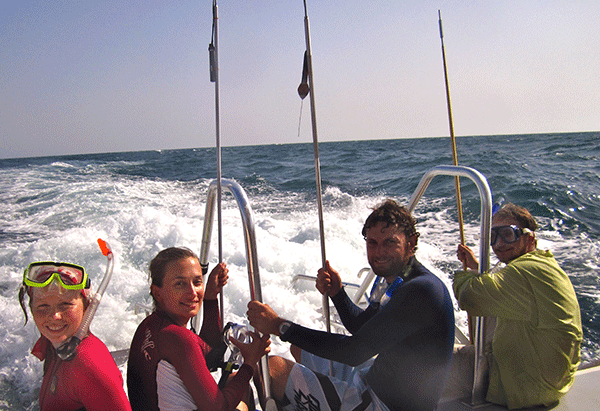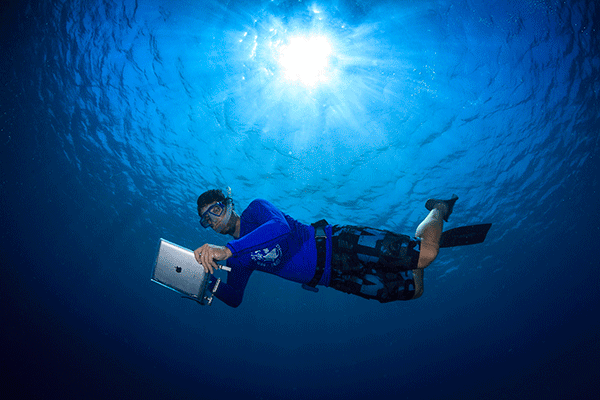
Alumni Michael Berumen, second from right, and Jesse Cochran, far right, search for whale sharks in the Red Sea. Once a shark is found, the team will photograph it for ID records, attach acoustic and satellite tags for tracking purposes, and take a small skin tissue sample for genetic analysis. Photo by Fernando Cagua.
Along the golden shores of Saudi Arabia, honors alumnus Michael Berumen (B.S. in zoology, summa cum laude, ’01) is making history. As the leader of a marine biology lab based at the King Abdullah University of Science and Technology (KAUST), he is helping to usher in modern science to a historically and biologically exciting region – the Red Sea. Among the lab’s many projects, Berumen regularly brings groups of taxonomic experts to explore the biodiversity of Saudi coral reefs, where they sometimes identify more than one hundred new species in just one week of fieldwork. Berumen and his colleagues hope to establish a natural history museum in Saudi Arabia – the first such institution of its kind in a country rich with opportunities for scientific research. “Most of these taxonomists have never had access to the vast majority of the Red Sea,” Berumen explains. “Now that KAUST exists, we can study almost 2,000 kilometers of coastline.”
Berumen’s odyssey began with a childhood passion for scuba diving. A native of Ft. Smith, Arkansas, he chose to study zoology at the land-locked University of Arkansas after learning about the institution’s growing academic opportunities from then-chancellor John White and administrators like Suzanne McCray and Maribeth Lynes. “This was around the time that honors was really taking off,” Berumen recalls. “They convinced me Arkansas was the place to go.”
As an undergraduate, Berumen spent a year abroad at Australia’s James Cook University, devoting one semester to classwork and another to research. The Australian fieldwork formed the basis of his zoology honors thesis on butterflyfish, which led to several papers that have established Berumen as a leading expert on this species.
His positive experience convinced Berumen to spread the word about the new honors opportunities at the University of Arkansas. “When I graduated in 2001, I stayed on to work for the university as a sort of outreach recruiter. I would take over a high school biology class for a whole day and basically give guest lectures, talking about my research and about the new honors opportunities in study abroad and research.”
In 2002, Berumen began his Ph.D studies at James Cook, commuting between Australia and Fayetteville to serve as a part-time instructor in the U of A’s biology department. After completing his doctoral work at James Cook in 2007, he accepted a postdoctoral position at Woods Hole Oceanographic Institute in Cape Cod, Massachusetts. Shortly thereafter, he joined KAUST and established the Coral Reef Ecology Lab. The lab continues to grow and currently he supervises more than 20 graduate students and staff members.
At KAUST, Berumen is involved in several projects, including an extensive transnational effort to model marine connectivity – the complex system of gamete fertilization and dispersal that provides insights into how fish move in the open ocean and on coral reefs, a process whose understanding is crucial to conservation efforts. “This work is helping us manage commercially important fish species in developed countries like Australia,” Berumen explains. “But the same work in the Philippines or Papua New Guinea, for example, can teach local people to manage their resources so that future generations can be fed – for these people, some species of fish are the only source of protein.”
Though he’s thousands of miles away, Berumen has continued to connect with the University of Arkansas community. Soon after taking his present post at KAUST, he accepted alumnus Jesse Cochran (B.S. in biology, ’05) – son of faculty members Suzanne McCray and Robert Cochran and, most importantly, an avid student of sharks – as an assistant on an expedition to tag the movements of whale sharks in the Red Sea. “Because he’s Suzanne’s son, working with Jesse was daunting, to say the least,” Berumen recollects. “But the opportunities for doing exciting, first-rate research in Saudi Arabia were second to none – he had to come.”
Despite inauspicious origins in a state seemingly bereft of any outlet for a student with a passion for marine biology, Michael Berumen has triumphed in that field, having published several articles in prime journals such as Science and Current Biology. In addition to his work with KAUST, he plans to soon release a book on butterflyfish ecology. He considers his honors experience at the University of Arkansas an indispensable resource in achieving his dreams.
“I can’t say enough about the folks in the Honors College,” he reflects. “They were my family away from family, and I had access to opportunities that furthered my career and truly impacted my life.”

